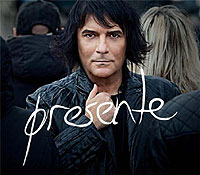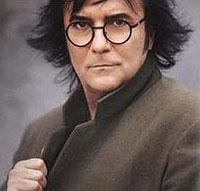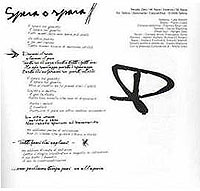Renato Zero, Presente
Published on May 30th, 2009 in: Current Faves, Issues, Music, Reviews |By Hanna
Presente is a great album—if you can get it. As a result of his breaking with Sony, Renato has released it independently, as he’s emphasized overly clearly in interviews. It’s like a perfect tiny illustration of protectionism: while the independent release has had many advantages—more control over promotion, a more detailed concept and, of course, the uncommercial 17 tracks of the CD—it also means it isn’t for sale anywhere outside of Italy. The Sorcini network has insured it gets shared, but it is a situation that should be resolved, as this is shutting many people out and alienating an already detached market.

And it doesn’t deserve such a small market. In many ways, this album signals a return to a more carefree, liberal, and familiar Renato. He has always played to his own audience, and chafed against fashion—sometimes playing up to it so much as to parody it, and sometimes going in the opposite direction—and this seems to be one of the times when he has washed his hands of it. Fans have mentioned that it is almost like the ’70s again and this seems to be the case. The kind of positivism and wholesome liberalism he is exuding is as foreign to the time as liberal religions, and despite the success of the album it’s unlikely to make waves as big the last two did.
It misses the stadium appeal of Cattura and the tender intimacy of Il Dono, and their grand scale, though it incorporates elements of both. “Professore,” the opener, has been called the most autobiographical track on the record, as it presents a wry and ironic look at his failed encounter with education. “Ancora Qui,” the single, is thumping and happy, an echo of “Come Mi Vorresti,” complete with a random-celebrity-studded video that is, in hindsight, rather lame. Especially if, like me, you have absolutely no idea who anyone in the video, save about two, are. It made its point though, I guess: that Renato is still here and still ready to take over the world with his army of Sorcini (albeit only the famous ones in this case).

Other interesting tracks are “Non Smetterei Più,” a kind of artistic love song duetted with soul singer and saxophone player Mario Biondi. It’s rare for Renato to duet outside of live contexts, and the result is great. Great and rather homoerotic. Biondi’s Barry White voice compliments Renato’s lighter bass well and combined with the sax it all sounds rather like a soundtrack for porn (in a good way). “L’ormonauta” is the token bawdy song, translating roughly as “The Sex Addict.” It’s rather like “Handsome Devil” by The Smiths, only with wacky guitars and in Italian, and possibly funnier. And at least it isn’t about impotence. “Spera o Spara,” includes one of his favorite puns in the title and is a 60s psychedelica romp that doesn’t really make any sense and has a lot of gurgling in it.
“Dormono Tutti” is a slightly off lullaby, rather like a well-known Dutch Dadaist poem called “Marc Groet’s Morgens de dingen,” in which a child says good morning to all the things in the house and the world. Though it has the tenderness and playfulness of a children’s story, it has a vaguely sinister feel as well, including shadows, tears, and fear of night as well as the comfort of dreams.
Several songs, such as “Almeno Una Parola” “Da Adesso,” and “Quando Parlerò Di Te” have the comforting familiarity that Il Dono had, while other songs like “Questi Amori” and “Ambulante” have a sudden pop-rock style very unlike any of Renato’s recent work and more like his ’90s albums.
Music aside, there are two other aspects of the album that bear discussing. Firstly, the length of the album, which is both its main problem and its strength. It makes the songs rather difficult to separate from each other at first, though that makes (re)discovering them more interesting. It was allegedly a point of great consideration on Renato’s part, who had originally intended 19 songs and left the last two out at the last minute. In a time where albums are a rarity and 17 tracks excessive, it creates an image of generosity and affluence of creative abilities that corresponds well with his persona.

Secondly, the packaging, which is often a statement of some sort, is very unlike most CDs issued. With the rise of the MP3 as the main music medium, CDs have become more minimal; Il Dono was initially like that with its slim case and rounded corners. Presente , on the other hand, is disguised as a little book. The sleeve design is rather like that of Il Dono, only it has a oddly loud color scheme of grey, black, and beige, and a lot of hilarious snapshots of Renato posing in woods with a bowler hat and imitating A Clockwork Orange.
Presente looks like a work unlikely to win over many new fans: it’s too idiosyncratic and though it fits into the Italian song tradition, it doesn’t fit there snugly. A lot of the songs seem to denote Renato behaving himself, but others show he has the odd kick in his gallop still. However, despite all this, the charm offensive he has unleashed of late, appearing even on Italian X Factor, seems to have regained him some of the popularity lost during his threeyear absence. It looks like he may be able to turn his oddity into a virtue, like he has done many times before.
Time limit is exhausted. Please reload the CAPTCHA.